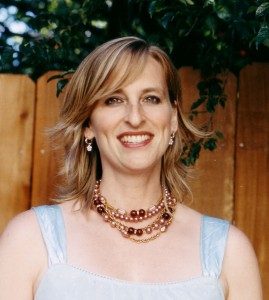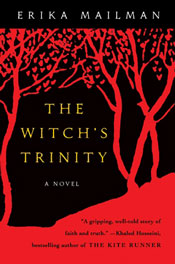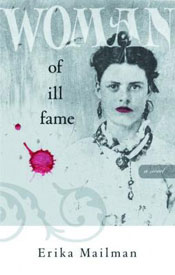 I am happy to introduce writer Erika Mailman, author of The Witches Trinity and Woman of Ill Fame. Erika will be co-presenting at the Historical Novel Society Conference: “The Witchcraft Window: Scrying the Past” with writer panelists Kathleen Kent, Mary Sharratt, and Suzy Witten.
I am happy to introduce writer Erika Mailman, author of The Witches Trinity and Woman of Ill Fame. Erika will be co-presenting at the Historical Novel Society Conference: “The Witchcraft Window: Scrying the Past” with writer panelists Kathleen Kent, Mary Sharratt, and Suzy Witten.
Sounds like a bewitching topic and session! And make sure you visit Erika’s website as she has an interesting story of coincidence to share about her family history and witches…
Do you have a most interesting question or crazy anecdote related to your writing you would like to share?
 As a child, I was always fascinated by witchcraft and remember reading everything I could get my hands on regarding the topic. I quickly learned it wasn’t pointy hats and riding brooms, but incredible suffering and persecution in part of Europe’s darkest hours. I remember staring at a family tree that hung in our stairwell, penned in some ancestor’s ancient hand, and spotting the name Alvira Cresey. I thought for sure she must be my witchcraft ancestor. It wasn’t until I was an adult, in the middle of writing the book later published as The Witch’s Trinity, that I learned I was the descendant of a woman accused of witchcraft. I received an email from my mother, forwarding one she’d received, that provided a link to information on Mary Bliss Parsons, who underwent trial at least twice and was acquitted. She died of old age. It was supremely uncanny to be working on this novel and learn of my connection to my ancestor of eleven generations ago—the lineage is so direct that my mother bears the Parsons name. She grew up in Southampton, Mass., and Mary Bliss Parsons had lived in nearby Northampton and Springfield (both villages where she was accused). My family had been very proud of its history and, we thought, well-informed, since I remember hearing about Mary’s husband, Cornet Joseph Parsons, a founding father. Yet somehow Cornet’s wife’s dark history had not been similarly passed down.
As a child, I was always fascinated by witchcraft and remember reading everything I could get my hands on regarding the topic. I quickly learned it wasn’t pointy hats and riding brooms, but incredible suffering and persecution in part of Europe’s darkest hours. I remember staring at a family tree that hung in our stairwell, penned in some ancestor’s ancient hand, and spotting the name Alvira Cresey. I thought for sure she must be my witchcraft ancestor. It wasn’t until I was an adult, in the middle of writing the book later published as The Witch’s Trinity, that I learned I was the descendant of a woman accused of witchcraft. I received an email from my mother, forwarding one she’d received, that provided a link to information on Mary Bliss Parsons, who underwent trial at least twice and was acquitted. She died of old age. It was supremely uncanny to be working on this novel and learn of my connection to my ancestor of eleven generations ago—the lineage is so direct that my mother bears the Parsons name. She grew up in Southampton, Mass., and Mary Bliss Parsons had lived in nearby Northampton and Springfield (both villages where she was accused). My family had been very proud of its history and, we thought, well-informed, since I remember hearing about Mary’s husband, Cornet Joseph Parsons, a founding father. Yet somehow Cornet’s wife’s dark history had not been similarly passed down.
Is there an era/area that is your favorite to write about? How about to read?
 It’s funny, a friend and I were talking about this recently. Why are we so avidly drawn to some historical periods, and some that we have zero interest in? I personally adore anything from the Victorian era and feel deep affinity to the French Revolution—but am left cold by the 1940s. In fact, one of my all-time favorite authors is Sarah Waters. I love her work and am in awe of her intricate plot mapping. I have read everything of hers and adored it—with the exception of The Night Watch, set in the ‘40s, which I have not been able to bring myself to read. In fact, I recently held it in my hands again recently and considered that I really ought to read it…and gently, lovingly placed it back.
It’s funny, a friend and I were talking about this recently. Why are we so avidly drawn to some historical periods, and some that we have zero interest in? I personally adore anything from the Victorian era and feel deep affinity to the French Revolution—but am left cold by the 1940s. In fact, one of my all-time favorite authors is Sarah Waters. I love her work and am in awe of her intricate plot mapping. I have read everything of hers and adored it—with the exception of The Night Watch, set in the ‘40s, which I have not been able to bring myself to read. In fact, I recently held it in my hands again recently and considered that I really ought to read it…and gently, lovingly placed it back.
Thank you Erika for the interview and see you at the HNS Conference June 21-13 in St. Petersburg, FL!
